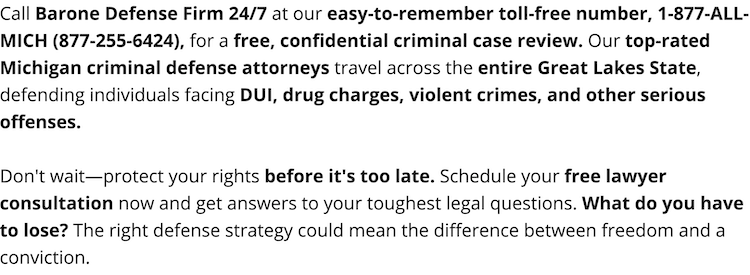Understanding Earned and Good Time Credits for Federal Prisoners
After you have been sentenced to incarceration by a United Stated District Court Judge for a violation of the Federal Criminal Law, you will be remanded to the custody of the Federal Bureau of Prisons (BOP). Soon thereafter, the BOP will be making a variety of determinations regarding your housing and your “out date.” The out date is the date an inmate first becomes eligible for release. A prisoner’s out date is rarely based on the actual sentence, but instead is based on a variety of factors and formulas, as will be discussed below. This means that a person sentenced to a minimum period of five years in prison rarely actually serves 5 years or 1,825 days.
How Does the BOP Calculate Good Time?
As it relates to your out date and the awarding of good time credits, the BOP will be applying 18 U.S. Code § 3624, which provides that any prisoner sentenced to a year or more may receive up to 54 days credit for each year of the prisoner’s sentence. However, this 54-day credit is subject to the BOP’s determination that a prisoner has exhibited “exemplary compliance” with BOP rules and regulations. Additionally, the BOP must also consider whether the prisoner is making good progress toward receiving a high school diploma or equivalent.
The statute clearly indicates that a prisoner should be afforded 54 days of good time for each year of the prisoner’s sentence. While this seems straightforward, prior to 2018, the BOP would not simply take 365 days and subtract from that 54 days to calculate a prisoner’s out date. Instead, they used a rather complicated math formula that often resulted in prisoners only receiving a maximum of 47 days of good time credit for each year of the sentence imposed instead of 54 days. This had something to do with a way of interpreting the phrase “term of imprisonment” contained in 18 U.S. Code § 3624 to mean “time served.” This method of calculation was upheld by the United States Supreme Court in Barber v. Thomas, 560 U.S. 474 (2010).
In 2018, Congress passed the First Step Act which indicated that all eligible prisoners receive 54 days rather than 47 days. As noted above, before this 2018 law, the BOP calculated the 54 days of good time for each year served. Based on the BOP’s interpretation of 18 USC 3624(b), the final year of incarceration was pro-rated. With the 2018 law, all qualifying inmates receive 54 days of good conduct time for each year. This is essentially a 15% reduction of the actual sentence imposed.
Are Time Credits Different from Good Time Credits?
In addition to the initial prisoner screening described above, The First Step Act also provides that the Department of Justice (DOJ) must develop a “risk and needs assessment system.” This system is then used by the BOP in its assessment of a prisoner’s risk to commit another crime, also known as recidivism. As part of the assessment, the BOP is required to place prisoners in programs and activities to reduce this risk of recidivism. As a reward for the successful completion of such program, a prisoner can earn additional time credits. These time credits are in addition to “good time” credits. These time credits, or said perhaps more properly, “earned time credits,” may result in the prisoner being placed into pre-release custody earlier. Pre-release custody includes things like home confinement or placement into a Residential Reentry Center.
Because the terms “time credits” and “good time credits” sound similar, it’s better to use the phrase “earned time credits” to distinguish between the two. Good time credits result in a 15% reduction in actual time served, whereas earned time credits may result in early release to a prerelease facility.
Do All Prisoners Compliant with BOP Rules Receive Earned Time Credits
Unfortunately, the answer is no. According to the First Step Act of 2018, § 3632, certain prisoners are ineligible to receive earned time credits if they have been convicted of one of the listed offenses, and there are many. Some examples include many forms of homicide, kidnapping, fraudulent use of a computer, carjacking, child pornography, many forms of sexual abuse, failing to register as a sex offender, and drive-by shootings.
Although these individuals are precluded from earned time credits, such prisoners can nevertheless use successful completion of recidivism reduction programs to earn other benefits. These include, for example, more visitation time, more minutes for phone calls, additional commissary privileges, or even possibly earn a transfer to a different, more desirable prison. A more desirable prison might be one with better accommodations or that is closer to the prisoner’s home.
What About Earned Time Credits for Child Pornography Charges?
Persons convicted of charges under chapter 110, which defines various kinds of child pornography, are not entitled to any good time credits. This prohibition specifically applies to the following sections of chapter 110, which is the Chapter of the United States Code broadly addressing various sex crimes and abuse toward children. The First Step Act specifically mentions sections 2251, 2251A, 2252, 2252A and 2260. These are the sections addressing such crimes as the possession, receipt, production, and distribution of child pornography. If you are facing a child pornography charge, then you should discuss how the First Step Act may impact your assessed out date and your eligibility for early release to a prerelease facility.
<< Back to the main Federal Criminal Law page || Next Page >>
 Barone Defense Firm Home
Barone Defense Firm Home
















